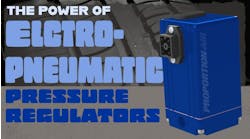Lawyers can provide unique product-liability perspective
By D. Schneider
Some lawyers know about litigating product-liability matters. Most manufacturers know about running design, production, and marketing operations. But a marriage of these two fields of knowledge seldom occurs, according to Randall L. Goodden, vice president of quality and product reliability, Everbrite Inc., an advertising-sign manufacturer in Greenfield, Wisc. and the author of "Preventing and Handling Product Liability," published by Marcel Dekker New York, N.Y., 1995.
Writing in For The Defense, the monthly journal of the Defense Research Institute, the nation's largest association of civil defense-litigation attorneys, Goodden suggests that the same attorneys that help manufacturers get through the traumatic experience of litigation could serve as independent product-liability-prevention consultants to help manufacturers avoid the possibility of future litigation.
In their litigation work, product-liability defense lawyers acquire substantial knowledge of the pitfalls and problems that arise during new product development and accompanying quality efforts. However, the author says, this knowledge is rarely if ever exploited by their manufacturing clients to prevent conditions that could lead to customer claims. Instead, Goodden writes, this knowledge merely becomes part of 20/20 hindsight once the manufacturers are sued. Experienced product-liability defense lawyers can provide valuable services that might greatly reduce exposure to lawsuits.
(Few manufacturers have in-house legal departments today. Those that do tend to limit their house counsel's work to labor negotiations, contracts, real estate, etc. They rarely touch product-liability matters. Because of the restricted environment, house counsel lacks the diverse working knowledge and experience gained by outside law firms.)
Many manufacturers lack the ability to look at product ideas from a critical legal perspective, says Goodden. Product-liability lawyers can help them learn to evaluate products with the following questions in mind - from a distinctively legal angle:
* What are the reasonable foreseeable uses of the product?
* What might end users do with the product that the manufacturer has not anticipated?
* What are the various ways that the products could injure users or cause property damage?
* Are such dangers obvious?
* To what unusual climatic or environmental conditions might the product be exposed?
* Are safety devices present or absent from the design?
* What kinds of warning labels or instructions should be included with the product?
* What legal complications can be envisioned by introducing the product to the marketplace?
* What types of testing should be done to ensure that products or their materials will be reliable?
These questions, writes Goodden, are the basis of a product analysis from a legal perspective - a perspective that manufacturers should welcome. And, he says, although some of the questions may have been asked or considered by their operational departments to a degree, they would not acquire the focus and intensity that can be brought to bear by outside legal counsel, nor would it have been from the same level of awareness and expertise. Teaching manufacturers how to analyze new products is one of the most valuable services that lawyer/consultants can provide in the long run.
Goodden notes that lawyers also can advise manufacturers in regard to contractual agreements with suppliers and subcontractors in order to protect against other liabilities. In addition, they can review contracts that manufacturers may have with their customers, including indemnification clauses.
Outside lawyer/consultants can help develop in-house product liability experts, Goodden adds. They can identify the purposes and responsibilities for such positions, help select the right individuals for these assignments, and then work with them on an ongoing basis. Similarly, they can help develop an internal product liability review board that could continue to address issues of quality and potential liability. Outside counsel, he writes, could even be a member of the review board, or could be available for additional guidance and direction when needed.
These lawyer/consultants naturally would become the first outside experts to be contacted whenever a new product-liability claim surfaces. Manufacturers may even request that their insurance carriers use these particular attorneys on future claims because of the attorneys' familiarity with the product involved. Or manufacturers may elect to retain these attorneys themselves to assist in litigation. Both the lawyers and the manufacturers would benefit from the established relationship.
Working closely with manufacturers, Goodden summarizes, outside lawyers can play a major role in avoiding the threat and actuality of product-liability litigation.
